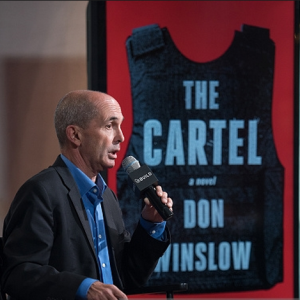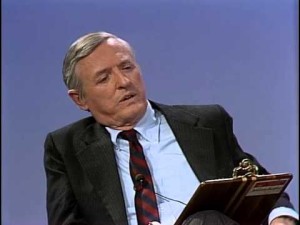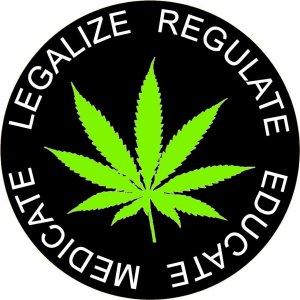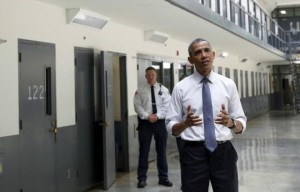 Don Winslow is the bestselling author of such crime and mystery novels as Savages. He is currently enjoying critical acclaim, as well as commercial success, with his latest novel, The Cartel, which chronicles the myriad reasons the War on Drugs has been a tragic failure.
Don Winslow is the bestselling author of such crime and mystery novels as Savages. He is currently enjoying critical acclaim, as well as commercial success, with his latest novel, The Cartel, which chronicles the myriad reasons the War on Drugs has been a tragic failure.
Of course, one can imagine all too well the “pornography of violence” and epidemic of corruption he depicts. Not to mention the cloying effect reading this novel might have on anyone familiar with nonfiction books by the late Charles Bowden, notably A Shadow in the City: Confessions of an Undercover Drug Warrior (2005) and Murder City: Ciudad Juarez and the Global Economy’s New Killing Fields (2010).
In any event, nothing dramatizes the futility of the War on Drugs quite like Mexican authorities allowing Joaquin “El Chapo” Guzman to escape from a maximum-security prison, for a second time, last weekend. This, after U.S. authorities helped them track and capture him just a year ago; and despite the fact that the Department of Justice describes him as the world’s most powerful drug lord. He heads the Sinaloa Cartel, which is arguably the shrewdest, richest, and most violent drug cartel in history.
 Mind you, his escape has been a godsend for sales of The Cartel. Not least because it includes a fictionalized account of El Chapo’s then notorious first escape in 2001.
Mind you, his escape has been a godsend for sales of The Cartel. Not least because it includes a fictionalized account of El Chapo’s then notorious first escape in 2001.
Yet I suspect Winslow will use a significant percentage of his royalties to support the campaign to end the War on Drugs. Especially because he demonstrated his commitment to this cause when he purchased a full-page ad in the June 28 edition of the Washington Post.
It took the form of “An Open Letter to Congress and the President,” in which he pleaded for them to legalize drugs. He argued that, at the very least, this would save the billions wasted each year fighting this “unwinnable” war, while generating billions in revenues by taxing drugs at the same rate as tobacco and alcohol. He summed up his plea as follows:
The War on Drugs is not only futile, it is wrong. The answer is legalization. The only way to win is to stop fighting.
 Not surprisingly, Winslow got (and is still getting) lots of media attention.
Not surprisingly, Winslow got (and is still getting) lots of media attention.
But I fear his plea to legalize drugs will prove no more effective than that of far more acclaimed and politically connected authors like William F. Buckley Jr.
Here, in part, is how Buckley pleaded, way back in the summer of 1995, for the New York Bar Association to use its good offices to help legalize drugs:
We are speaking of a plague that consumes an estimated $75 billion per year of public money, exacts an estimated $70 billion a year from consumers, is responsible for nearly 50 percent of the million Americans who are today in jail, occupies an estimated 50 percent of the trial time of our judiciary, and takes the time of 400,000 policemen — yet a plague for which no cure is at hand, nor in prospect…
It is outrageous to live in a society whose laws tolerate sending young people to life in prison because they grew, or distributed, a dozen ounces of marijuana…
I would hope that the good offices of your vital profession would mobilize at least to protest such excesses of wartime zeal … and perhaps proceed to recommend the legalization of the sale of most drugs, except to minors.
(The National Review, February 12, 1996)
As it happens, I have been in the vanguard of this campaign all of my adult life. And I don’t mind admitting that I could never proffer a plea as compelling as Buckley’s, although not for want of trying – as the following excerpts from just a few of my commentaries attest.
___________________
From “Landmark Healthcare Decisions by U.S. Government,” June 12, 2005:
Consider that every year 435,000 people in the United States die from tobacco use. (Cigarettes kill more Americans than alcohol, car accidents, suicide, AIDS, homicide, and illegal drugs combined.) And, conversely, that there’s not a single documented case of anyone dying from marijuana use.
So what, pray tell, could be the rationale for the geniuses on the Supreme Court to rule that allowing doctors to prescribe marijuana for medicinal purposes would be hazardous to our health?
 From “Former Mexican President: Legalize Drugs!” October 20, 2011:
From “Former Mexican President: Legalize Drugs!” October 20, 2011:
Former Mexican President Vicente Fox has been making news all year: not only by blaming insatiable demand in the United States for the drug-related violence that has turned Mexico into a veritable war zone, but also for declaring that the legalization of production, transit, and sale of all prohibited drugs is the only way to fight the so-called ‘war on drugs,’ which both countries have been fighting to no avail since 1971…
Frankly, ever since Prohibition (1919-1933) all reasonable people should have developed an instructive appreciation of this variation on George Santayana’s famous quote, namely: that those who fail to learn from history are doomed to repeat it…
So I welcome Fox. I just wish he had the balls to come on board when he was president from 2001 to 2006. Because his voice would have carried a great deal more political weight back then.
From “Legalize Marijuana!” June 5, 2012:
When it comes to progressive laws in the United States it is axiomatic that as California goes, so goes the nation. This was the case when it legalized marijuana for medicinal use in 1996. (Seventeen states, including Washington, DC, have followed suit.)
Therefore, it is very noteworthy that New York is assuming this vanguard role in decriminalizing possession of marijuana for personal use (i.e., not necessarily for medicinal use)… Not to mention the benefit to Blacks and Hispanics who compose the vast majority of those routinely prosecuted and incarcerated for possession of small amounts of marijuana…
As one who has been advocating for the decriminalization not just of marijuana but of all drugs, I welcome this second baby step along this progressive road (legalizing medicinal use being the first). I only hope that, in this case, as New York goes, so goes the nation.
From “Obama on Marijuana,” February 6, 2014:
Just as I was always certain Obama was a closeted supporter of legalizing same-sex marriages, I’m certain he is a closeted supporter of legalizing marijuana too. Not least because he’s intellectually honest enough to appreciate that only rank moral hypocrisy (and vested interest in the prison industrial complex) can explain why alcohol – with its many harmful and, in far too many cases, deadly effects – is legal, but marijuana – with its relatively mild and, in very many cases, medicinal effects – is illegal.
And let’s be clear, the harm alcohol causes to others ranges from drunken arguments that lead to domestic violence, to driving under the influence that leads to vehicular homicides.
____________________
 Alas, faith-based opposition, ignorance, and hypocrisy are such that pleading for politicians to legalize drugs is rather like pleading for priests to endorse abortions.
Alas, faith-based opposition, ignorance, and hypocrisy are such that pleading for politicians to legalize drugs is rather like pleading for priests to endorse abortions.
Truth be told, the campaign to legalize drugs has proven every bit as futile as the War on Drugs – albeit not nearly as costly in terms of wasted blood and treasure. Indeed, “legalize-it” campaigners might be only slightly less naïve than Nancy Reagan was when she thought she could curb drug use by launching her “Just Say No” campaign.
That said, I derive a little consolation from the executive actions President Obama is taking. They include commuting prison sentences of nonviolent drug offenders and championing legislation to redress the cruel and unusual sentencing of people to years, if not life, in prison for petty drug offenses.
Just yesterday, he drew worldwide media attention to this cause, which Winslow and Buckley never could, when he became the first sitting president to visit a federal prison. And here, in part, is how he used the occasion to plead on behalf of the tens of thousands of young people serving patently unfair sentences:
When they describe their youth and their childhood, these are young people who made mistakes that aren’t that different than the mistakes I made and the mistakes that a lot of you guys made. The difference is they did not have the kinds of support structures, the second chances, the resources that would allow them to survive those mistakes.
(New York Times, July 16, 2015)
Hear, hear!
Related commentaries:
Landmark healthcare..
Legalize drugs…
Legalize marijuana
Real drug war…
Obama on marijuana
Times calls for legalization…